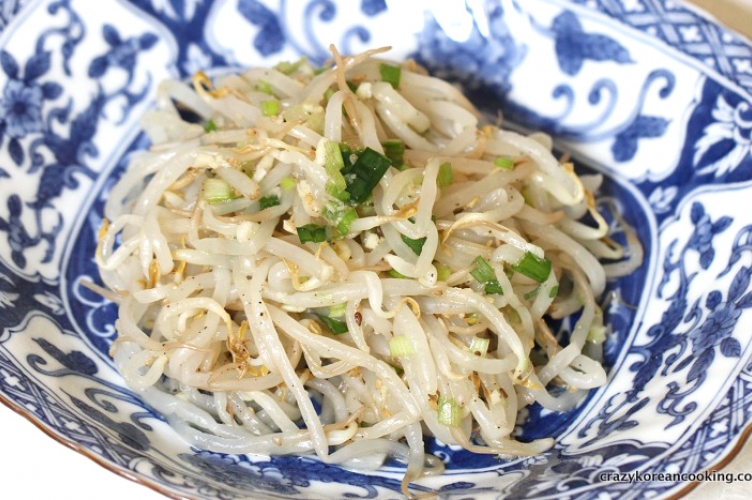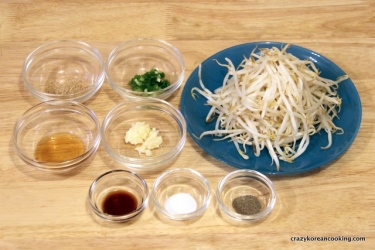Mung Bean Sprouts Side Dish, Sukju Namul
숙주나물

Sukju Namul is one of the vegetable side dishes that appears often on Korean lunch and dinner tables. (Sukju means "mung bean sprouts." Namul means "vegetable side dish.") It's a great side dish to balance out a heavy meat dish or spicy food. It's also perfect for those who are looking for a low calorie meal or snack. Sukju namul can also be used as a topping on bibimbap. Mung bean sprouts look similar to soy bean sprouts but they are softer in texture and have a lighter taste. Mung bean sprouts are more readily available in North American grocery markets since it's also used in other Asian cooking whereas soy bean sprouts tend to only be found in Korean grocery markets.
Buy Korean ingredients online here.
Sukju Namul is one of the vegetable side dishes that appears often on Korean lunch and dinner tables. (Sukju means "mung bean sprouts." Namul means "vegetable side dish.") It's a great side dish to balance out a heavy meat dish or spicy food. It's also perfect for those who are looking for a low calorie meal or snack. Sukju namul can also be used as a topping on bibimbap. Mung bean sprouts look similar to soy bean sprouts but they are softer in texture and have a lighter taste. Mung bean sprouts are more readily available in North American grocery markets since it's also used in other Asian cooking whereas soy bean sprouts tend to only be found in Korean grocery markets.
Buy Korean ingredients online here.
INGREDIENTS
shop these ingredients online »for blanching mung bean sprouts | ||
| 2 lb 3 oz | Mung Bean Sprouts 숙주 | |
| 2 tsp | Salt 소금 | |
| 20¾ cups | Water 물 | |
for seasoning | ||
| 1 tsp | Salt 소금 (may need more or less depending on type and brand) | |
| 1 tsp | Soy Sauce for Soup (Gukganjang) 국간장 | |
| 1⅔ tbs | Sesame Oil 참기름 | |
| 1⅔ tbs | Garlic (minced) 다진 마늘 | |
| 3⅓ tbs | Chopped Green Onion 다진파 | |
| 2 tsp | Sesame Seeds 깨 | |
| ¼ tsp | Black Pepper 후추 (optional) | |

Optional Ingredients and Substitutions
Gukganjang (soy sauce for soup): If you don't have gukganjang, add more salt.
Black pepper: Depending on your preference, you can omit black pepper.
Good to Know
Salt: If available, natural sea salt always makes food taste better. Remember, sea salt has a different saltiness than table salt. So, taste as you add gradually. If you are using coarse salt, make sure it's mixed really well.
More questions? Please leave your questions below in the comments section. We will do our best to answer as soon as we can.
instructions |
photos |
summary |
|---|---|---|
Ingredient amounts in the recipe instructions are for the default serving size. |
Click to enlarge photos. |
Ingredient amounts in the recipe summary are for the default serving size. |
1. WashWash 200g of mung bean sprouts thoroughly in cold water two or three times. Remove any bad beans or roots. Some people remove roots but it’s not necessary for mung bean sprouts. |
1
Wash thoroughly
Remove bad beans & roots | |
2. BlanchBoil 4 cups of water on high heat. Add ½ tsp of salt and blanch mung bean sprout in boiling water on high heat for 2 min or until the bean sprouts die down. Do not over cook. |
2
Boil 4 cups water High Heat Add ½ tsp salt Blanch bean sprouts in boiling water High Heat | |
3. RinseRinse blanched green bean sprout twice in cold water. Gently squeeze all the water out with hands. |
3
Rinse in cold water twice Squeeze water out | |
4. SeasonSeason green bean sprouts with ¼ tsp salt, ¼ tsp gukganjang (soy sauce for soup), 1 tsp sesame oil, 1 tsp minced garlic, 2 tsp of chopped green onion, ½ tsp sesame seeds and ⅛ tsp black pepper (optional). Mix well. If you don’t have gukganjang (soy sauce for soup), just add another ¼ tsp of salt. |
4
Season
Mix well | |
5. ServeServe on a side dish plate. You can sprinkle more sesame seeds on top as a garnish if you like. Enjoy! |
5
Enjoy! |













 2 min
2 min